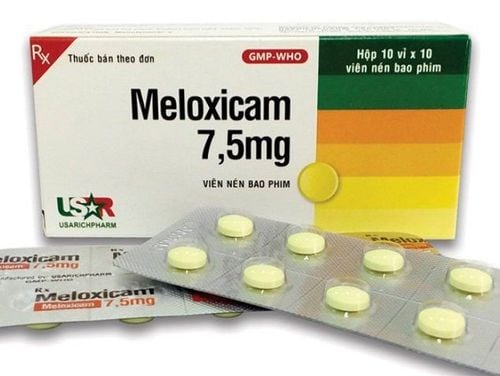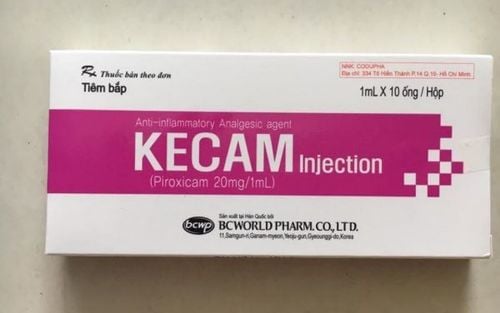This is an automatically translated article.
Marixime is a drug used in the treatment of pain of osteoarthritis, spinal pain, rheumatism. The fact that users know the information about the drug makes the process of use safer and more effective.1. What is Marixime?
Marixime is classified as a non-steroid pain reliever and anti-inflammatory drug. The main active ingredient of Marixime is Etoricoxib. Each Marixime film-coated tablet may contain 60mg, 90mg or 120mg of Etoricoxib, depending on the amount included by the manufacturer.
2. Uses of Marixime
Marixime drug with the active ingredient is Etoricoxib, which is a non-steroid pain reliever. Etoricoxib is a selective COX-2 inhibitor, used to reduce pain and inflammation in the joints and muscles of patients. Therefore, the drug is mainly used in the treatment of pain caused by arthritis, spondylitis, joint pain caused by gout.
In addition, Marixime with its anti-inflammatory and analgesic properties is also used in pain relief after dental surgery.
3. Indications for taking Marixime
With rheumatic pain, arthritis caused by spinal disease or gout, Marixime is specifically indicated as follows
Treatment of acute and chronic pain of osteoarthritis Treatment of pain of febrile spondylitis ankylosing spondylitis Acute gouty arthritis Rapid relief of acute and chronic pain Relief of primary dysmenorrhea Pain relief after dental surgery
4. Contraindications to the drug Marixime
As a pain reliever, non-steroid anti-inflammatory, Marixime has a rather limited audience. Therefore, in some cases Marixime drug is contraindicated, namely
Patients who are sensitive to the components of Marixime drug Patients with a history of asthma, urticaria and allergy to Aspirin, anti-inflammatory drugs Non-Steroid Patients with congestive heart failure, persistent hypertension with levels above 140/90 mmHg and inadequate control Patients with ischemic heart disease, peripheral arterial disease or cerebrovascular disease. Patients with Child-Pugh score >= 10, or serum Albumin concentration < 25g/L. The patient is suffering from peptic ulcer, intestinal bleeding, digestive system. Patients with ClCr < 30 mL/min.
5. Dosage & how to take Marixime
Marixime drug is prepared for oral use, patients take Marixime with a full glass of water, drink 1 hour after a meal.
Dosage in degenerative osteoarthritis: 30mg/day or 60mg/day, taken once a day Dosage in acute gouty rheumatic arthritis: Maximum dose should not exceed 120mg/time/day , use up to 8 days. Dosage in primary dysmenorrhea: The maximum dose should not exceed 120mg/time/day, for a maximum of 8 days. Dosage for patients with liver failure with Child - Pugh 5-6: The maximum dose should not exceed 60mg/time/day. For patients with Child-Pugh 7-9, the dose should be reduced to 30 mg once daily.
6. Marixime side effects
Like other non-steroidal anti-inflammatory drugs, Marixime also causes some mild and serious side effects as follows
Common side effects: Asthenia with fatigue, headache, lower extremity edema, increased blood pressure, indigestion, heartburn, reflux, nausea, headache, increased liver enzymes. Uncommon side effects: Esophageal ulcers, heart failure, hyperkalemia, bronchospasm, rash. Rare side effects: Hematopoietic dysfunction, kidney damage, myocardial infarction, Stevens - Johnson syndrome, toxic epidermal necrolysis syndrome, angioedema, urticaria, temporary decrease in visual acuity, tinnitus ...
7. Notes when using drugs
Special care is needed in patients with a history of gastrointestinal bleeding. When treating with Marixime in these subjects, gastric ulcer should be prevented with drugs that reduce gastric acid secretion (omeprazole, esomeprazole...).
Special attention should be paid to elderly patients, over 65 years old, who have had an acute asthma attack.
Monitor fluid retention, edema, and hypertension in patients who have had or are experiencing similar conditions. Monitor kidney and liver function while taking Marixime.
In summary, Marixime is effective in the treatment of bone and joint diseases, the use of which should be prescribed by a specialist doctor to ensure the most effective use.









